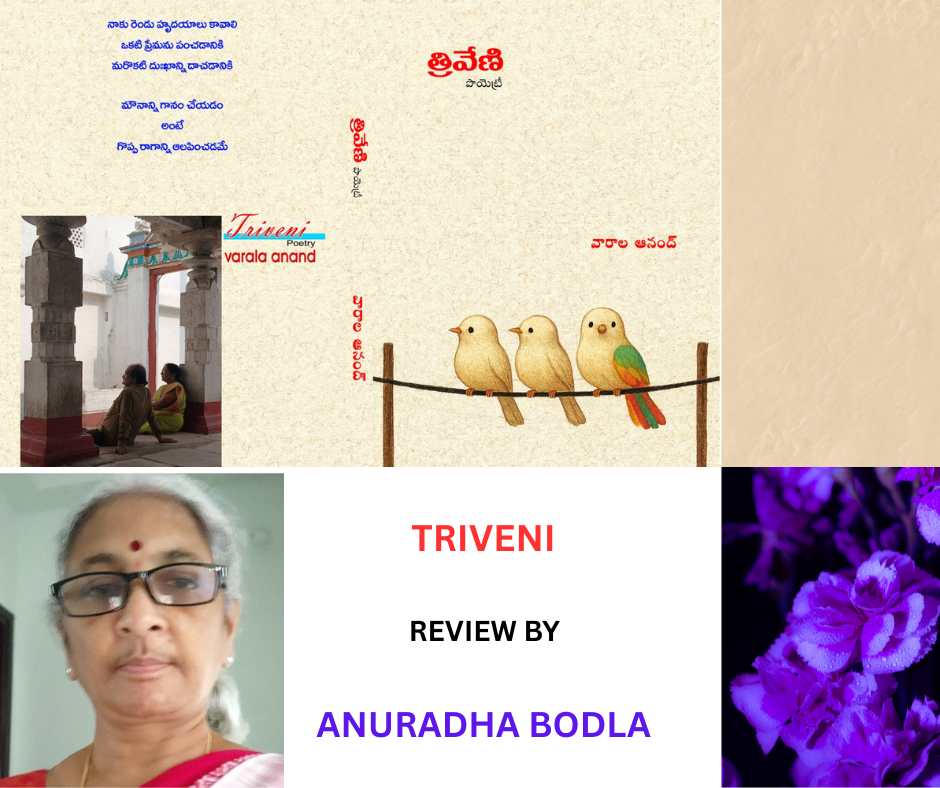Jan 09, 2026
Jan 09, 2026
by Varala Anand
‘Triveni’: Three-Line Poems by Varala Anand
Review by Anuradha Bodla

‘Triveni’ the confluence of three rivers is an apt title for Varala Anand’s collection of three-line poems. Though brief in form, these verses carry profound truths about life.
Each poem is a gentle wave in a vast confluence flowing through nature, human emotions, friendship, memories, the poet’s village, and his very sense of human being.
Anand’s vision “Poetry is a journey from nature back into nature” finds perfect expression here.
The book opens with a delicate moment of introspection:
“The sound of someone knocking
Is it the door of the house
Or the door of the heart?”
From this very first poem, the reader is drawn inward forgetting the outer door while listening at the heart’s threshold.
“Darkness hasn’t yet faded,
The clouds haven’t stretched their limbs,
Birds silently carry the eastern light on their wings.”
Anand’s imagery of nature is tender and lyrical. Elsewhere, he writes:
“I stepped out for an evening stroll,
The cool breeze
Joined me as a friend.”
Through such lines, his deep kinship with the natural world is quite evident.
“We came to know
Whether we knew or not, we’ll leave
But to tell what we know that’s the hardest.”
Here he urges us without saying so directly to shed the arrogance of knowing everything.
In another sharp observation he writes…
“When I listened with lightning eyes
The poets around me
Stepped aside as I began to write.”
He subtly critiques the competitive self-centered nature of today’s literary world where true listeners and readers are scarce.
“You danced to the jibes
Delighted in couplets
And left like a traveler”
A tender elegy to a departed friend of the poet.
“That’s the riverbank
That’s the thread of affection from my village
A fair of poor folk.”
A nostalgic remembrance of his roots.
About Vemulawada’s kode mokkalu (bullock vows), Anand writes:
“Here, devotees tie not just bulls,
But their faith as well.”
And elsewhere
“The breath of Shiva and Parvati here
Is the very breath of Telangana.
What a wonder is on Rama’s wedding day
They solemnize Shiva’s too
‘Forehead mark or side mark, all are equal here.”
Through such lines, he celebrates the spiritual and cultural inclusiveness of Vemulawada, a temple town, his birth place.
And poet’s affection for his birthplace finds expression in:
“The village that bore my mother,
The zeal of sweet-makers, the fame of parrots (CHILIKALU)
A garland of SWEETS (BATTEESALU)
my procession of memories.”
And again:
“Rajanna’s darshan is no mere ritual,
It’s a poetic awakening,
A cry of anguish rising from the soul.”
His poetry is thus inseparable from his village, his people, and his memories.
“We easily forget moments of laughter,
But can never leave the dampness of sorrow.”
Yet he reminds us:
“Let not only cool breezes bring comfort
Even in the heat
Let your smile be the address.”
He encourages balance to welcome both joy and sorrow with equal grace.
Anand’s another poem echoes this thought:
“Forget the sorrow, Hide the joy.
Like sorting flowers and thorns,
I keep each flower of experience.”
In another, he muses:
“I loved the flower and its fragrance
Time took away the flower
But the fragrance stayed with me.”
A beautiful reflection that what we love may fade, but its essence lingers.
“Dreams that swing like cradles,
Efforts that bow in surrender
Between the two lies an abyss.”
He reminds us that without sincerity and effort, nothing can be achieved.
“Life isn’t just hopeful,
It’s full of delusions too
Wisdom lies in choosing between them.”
A succinct statement of mature life philosophy.
His social awareness, too, is acute:
“The farmer who sang while sowing
Had to fall silent
By the time he reached the market”
A moving image of rural hardship.
He observes the alienation of urban life:
“The villager who came to the city,
When he asked for an address,
Everyone said check Google Maps.”
And the modern fatigue of digital life:
“Online work from home all day
Office calls till midnight,
It’s been ages since I saw a sunrise.”
With humor and irony, he comments on changing lifestyles:
“Burgers, pizzas,
Zomatos and Rapidos
Distance from the stove, burden on the stomach”
Indeed, Anand proves the saying “Nothing is unworthy of poetry.”
In every poem, the third line stands as a culmination a turn of thought, a revelation, or a crown that completes the emotion. Some lines make you sigh “Oh!”, others “Aha!”; some bring a smile, others stir deep thought.
A few poems may feel elusive, and some seem to pause after two lines yet almost all justify the name Triveni, harmoniously merging three streams of expression into one poetic flow.
08-Nov-2025
More by : Varala Anand